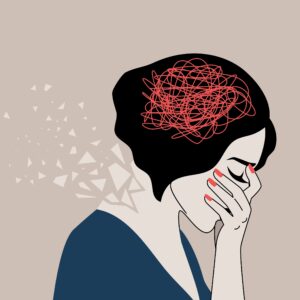
Menopause and Anxiety
Menopause and Mental Wellbeing – Anxiety
Mood changes around menopause, including low mood, depression-like symptoms and anxiety are common around menopause affecting 15-50% of post-menopausal women.[1]
Common symptoms include irritability, forgetfulness, low mood, loss of confidence, and trouble concentrating or “brain fog.”
Fluctuating and declining hormone levels may play a role, especially if sleep is affected, as this can exacerbate these symptoms. And, they can have a significant effect on people’s work and family life as well as their quality of life.
Anxiety can make you feel nervous, worried, panicky and fearful. For many people this is transient and dependent on situations like increased pressure at work, but it may be chronic and can become an anxiety disorder. If you feel anxious for no reason, your anxiety doesn’t go away or your anxiety affects your quality of life, you might have an anxiety disorder. It is important to speak to your doctor. One in three women are affected by an anxiety disorder at some stage in their life.
Symptoms of anxiety
People may have different experiences of anxiety and they can vary depending on the type and level of anxiety.
Physical symptoms may include:
- Sweating
- Feeling sick
- Find it hard to breathe
- A dry mouth.
Emotional symptoms may include:
- Focusing on your fears
- Imagining worst-case scenarios
- Have racing, uncontrollable thoughts.
Behavioural symptoms may include:
- Avoiding places or situations where you might feel uncomfortable
- Avoiding social contact, talking to friends or work events for example.
It’s important to know it that there is a lot that can be done to help and you do not have to suffer in silence. If you’re struggling, seeking support from your doctor is crucial. Treatment options can vary depending on the underlying cause, and it’s essential to find what works best for you.
Treatment options include:
- If the cause is hormonal Hormone Replacement Therapy (HRT) or Menopause Hormone Therapy (MHT) as it is now commonly called, can be beneficial for mood and anxiety. It may not make it go away completely, but for some people it can provide considerable relief.
- Cognitive behavioural therapy (CBT) has good evidence behind it for low mood and anxiety. It is a tool that can help you reframe the way you think about things and has been shown to be effective in reducing anxiety and improving mood.
- Practicing mindfulness can beneficial for some people as it helps to reduce stress and as a result, reduce anxiety.
- Regular exercise is also hugely beneficial for mood and anxiety
- Eating a healthy diet with lots of fruit and veggies and omega 3 (from fatty fish, nuts and seeds) can also help alleviate anxiety symptoms[2]
- Improving sleep – easier said than done, but there are Apps like Sleepio that may help with insomnia. Exercising, eating well, not smoking, drinking less alcohol, reducing screen time in the evening, getting natural light in the morning and progressive muscle relaxation techniques are some tips that may help improve sleep. If you snore and think you may have sleep apnoea, speak to your doctor. This interferes with your sleep too and has long term helath implications.
- Medications like antidepressants can help if clinical depression is diagnosed and there are medications for anxiety can help with that. It’s important to distinguish between mood changes due to menopause and clinical depression. If you’re experiencing persistent low mood, and start either one of these and there is no improvement, speak to your doctor. In some cases, people may need to take both HRT and anti-depressants for a period of time.
It’s important to take time for yourself, whether it’s through simple activities like taking a walk. Some women find talking too others who are going through similar experiences is helpful for support and understanding.
Sources:
https://www.jeanhailes.org.au/health-a-z/anxiety
References:
- Huang S, Wang Z, Zheng D, Liu L. Anxiety disorder in menopausal women and the intervention efficacy of mindfulness-based stress reduction. Am J Transl Res. 2023 Mar 15;15(3):2016-2024. PMID: 37056841; PMCID: PMC10086901.
- Aucoin M, LaChance L, Naidoo U, Remy D, Shekdar T, Sayar N, Cardozo V, Rawana T, Chan I, Cooley K. Diet and Anxiety: A Scoping Review. Nutrients. 2021 Dec 10;13(12):4418. doi: 10.3390/nu13124418. PMID: 34959972; PMCID: PMC8706568.
[1] Huang S, Wang Z, Zheng D, Liu L. Anxiety disorder in menopausal women and the intervention efficacy of mindfulness-based stress reduction. Am J Transl Res. 2023 Mar 15;15(3):2016-2024. PMID: 37056841; PMCID: PMC10086901.
[2] Aucoin M, LaChance L, Naidoo U, Remy D, Shekdar T, Sayar N, Cardozo V, Rawana T, Chan I, Cooley K. Diet and Anxiety: A Scoping Review. Nutrients. 2021 Dec 10;13(12):4418. doi: 10.3390/nu13124418. PMID: 34959972; PMCID: PMC8706568.
